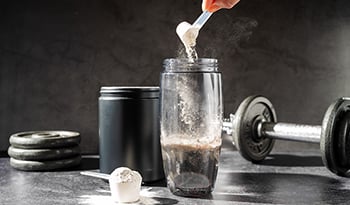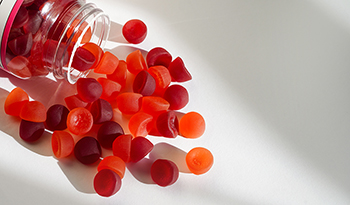Can Beetroot Powder Benefit Your Workout? Here’s What A Coach Thinks

Over the last decade, there has been growing popularity around beets, and more specifically in the context of supplements and performance, beetroot powder or beet. The discussion around beetroot powder typically involves whether this supplement is useful for endurance performance and potential overall performance in the weight room.
If you’ve been on the fence about investing in beetroot powder, then hopefully this article can help you navigate this topic. In this article, we’re going to discuss why nitrates, the nutrient that beetroot powder is high in, may be beneficial for your endurance performance, overall health, and potentially your performance in the weight room.
It’s important to note that much like other supplements, there is still research needed to draw definitives across the board about beetroot powder, so we’ll be looking at what the current research highlights and then suggesting ideas accordingly.
Why Beets and Beetroot Powder?
Beets and beetroot powder are known for their high composition of nitrates. When our body has a higher composition of these nutrients, then generally, our abilities to produce nitric oxide increase. Nitric oxide is an important signaling molecule and compound in the body that helps facilitate multiple physiological mechanisms.
In the body, nitric oxide can play a role in multiple processes and one of the most common includes serving as a means for assisting the body with vasodilation and vasoconstriction. If the body can more efficiently dilate and constrict blood vessels, then it can more efficiently transport nutrients, regulate blood pressure, and stimulate the release of certain hormones.
Beetroot is available to consume as a whole vegetable, or as a supplement in powder, pill, liquid, or even gummy forms. When it comes to working out, beetroot powder is the form that’s most often used.
Why Beetroot Powder for Working Out?
In the context of exercise, if our body can be more efficient with vasodilation and vasoconstriction, then it will be better poised to transport nutrients like oxygen and other workout-boosting compounds like glucose more efficiently.
When endurance training, if we can transport these compounds faster and more efficiently, then, in theory, we’ll be able to prolong our activities and potentially lengthen the onset of fatigue. If we can’t get oxygen to our muscles more efficiently, then we may run into a performance-limiting wall of exhaustion later.
In the gym, when our body can more efficiently transport nutrients, then we can better “chase pumps” which is essentially the idea of creating an adaptation with resistance training that results in a better hypertrophic response within muscles. If our muscles can deliver fuel and oxygen more efficiently, then we may be able to train them longer, which in theory, could help us take them to higher levels of mechanical tension which is needed for muscular hypertrophy.
Beetroot Powder Benefits
Below, we’ll discuss two benefits of beetroot powder for working out and discuss what some of the research suggests when consuming beetroot powder for boosting workout performance.
1. Potentially Improve Endurance Performance
The first, and arguably biggest benefit of beetroot powder, is its potential to improve endurance performance. Multiple studies have suggested that beetroot powder may have a small benefit for endurance performance outcomes and it’s theorized that this is due to beetroot powder’s capabilities to increase oxygen transportation.
One study suggested that beetroot juice supplementation helped to reduce oxygen cost during moderate and high-intensity exercise. In addition, it was suggested that beetroot juice also helped to extend the time to exhaustion for the study population.
In this study, participants were split into two groups, and one consumed 500ml/day of beetroot juice while the other consumed a placebo. They then tested with moderate and high-intensity exercise on days 4-6. The authors noted that blood nitrate levels were elevated in the beetroot juice group on days 4-6.
2. Possibly Increase Our Ability to Handle High-Intensity Exercise
Another benefit that may come along with consuming beetroot powder is that it may help our body with creating more efficient muscle contractions. If our body can be more efficient in regard to high-intensity muscle contractions, then we should be able to prolong our time of high-intensity exercise.
One study that had a similar flow to the study above looked at how beetroot juice influenced pulmonary oxygen uptake and muscle metabolism during low and high-intensity exercise. Participants in the study consumed beetroot juice, then participated in low and high-intensity exercise sessions on days 4-6 in the form of a step test.
In low-intensity exercise, it was suggested that beetroot juice helped to attenuate the reduction in muscle phosphocreatine levels, and in high-intensity exercise, the beetroot juice was suggested to improve time to exhaustion.
This could be useful information for athletes and lifters that regularly participate in high-intensity training sessions that present themselves as repetitive bouts of activity. For example, in the two studies above, the authors used a step test. In the gym, this could look like higher rep sets where we’re demanding the muscles contract multiple times in order to create positive training adaptations.
It’s important to note that both of the studies here looked at smaller populations and larger studies are needed to draw any definitive conclusions or statements that would suggest that beetroot powder always works for everyone. Beetroot powder may come with performance-enhancing benefits, but it’s not going to replace a well-thought-out training plan and consistent effort.
When to Take Beetroot Powder
It’s suggested to consume beetroot powder between 1-3 hours prior to your workouts. This is when it’s said that blood nitrate levels peak due to nitrate consumption.
If you’re trying to optimize your beetroot powder consumption, then experimenting within this time frame would be a smart and rational call. They provide a range because everyone’s body will digest the beetroot powder at different rates, so experiment to see what works best for you.
It may be useful to experiment with different times of consumption and how you’re consuming the beetroot juice which we’ll discuss below. Both of these can be influenced by the style of training you’re performing. For example, if you don’t like to consume anything prior to a hard training session, then you’d likely want to consume the beetroot powder shake further out from your training session.
How to Consume Beetroot Powder
There are multiple ways to consume beetroot powder. The most common way is to simply drink it as a standalone shake mixed with an amount of water that is suggested on the beetroot powder supplement you’re using.
The second is to mix with a shake for additional flavor and nutrients. Below is a quick beetroot powder shake recipe for anyone that wants to add their beetroot powder to a normal shake.
Beetroot Powder Protein Shake Recipe
Ingredients:
- 1 cup ice
- 1 serving of beetroot powder
- 1 cup spinach
- 1/2 cup blueberries or strawberries
- 1 serving of non-flavored protein powder (whey or collagen)
Directions:
Blend all ingredients together until smooth.
This shake is tasty and it’s packed with additional nutrients, protein, and nitrates which are also naturally present in spinach.
Final Remarks
Beetroot powder can be a potentially awesome tool for your training needs and wants. With its proposed benefits for endurance performance and other health benefits, beetroot powder can be a powerful low-hanging fruit tool to implement in your weekly training.
Before utilizing any new supplement in your regimen, it’s always a good idea to first consult with your respective medical professional.
References:
- https://www.ncbi.nlm.nih.gov/pmc/articles/PMC5295087/
- https://jissn.biomedcentral.com/articles/10.1186/s12970-017-0204-9
DISCLAIMER:This Wellness Hub does not intend to provide diagnosis...
















































































 Table of Contents
Table of Contents















